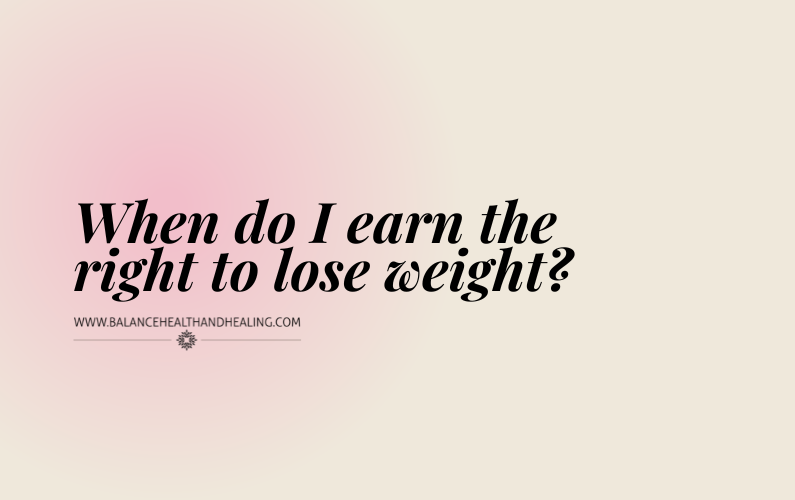A client recently said, “Anna, I’ve been working on my relationship with food and my body for a long time. I feel pretty confident and stable in recovery. When do I get to work on changing my body?” And I replied, “You mean, when do you earn the right to lose weight?” To which she responded, “Exactly.”
This may resonate with you on your own journey with body and food. I’ve heard similar versions of this dialogue from several clients. A rendition of, “Now can I lose weight the ‘right’ way?”
First, what is always true is you have body autonomy. You have every right to claim your body in whatever ways feels true to you.
With that said, if weight loss feels true to you, I would want to understand why.
Why do you want to lose weight? What do you believe would be different for you if you lost weight? What is unacceptable about your current shape and size?
Almost universally, I hear clients say they will “feel more confident” if they lose weight. When I hear that, I interpret that to mean, “I believe I am more likely to be accepted and loved by others. Even admired. I can show up in my body in spaces and not worry about rejection. I will also find myself more acceptable and loveable; therefore, I won’t reject myself.”
It is true that our society reinforces weight loss, admires weight loss, and gives more respect and admiration to people in smaller sizes. It then follows that it makes sense that you may believe you would feel more confident by also being in a smaller size. You may even experience, in your history of weight change, an increased sense of confidence in a smaller size.
But what is that confidence based on? It is based on something external to you. It is based on perception. And something external is never sustainable. True confidence is an inside job.
And true belonging is not a size. The diet industry thrives on our fears of rejection and loneliness and perpetuates the lie that diverse bodies are unacceptable. People of every shape and size belong. They are found in communities, marriages, families, and every type of relationship available to our species. If we take the time to notice all the humans around us in all their diversity, we will know this to be true.
Therefore confidence and belonging is not size dependent.
Another common reason to want to lose weight is for “health.”
It is also a fallacy that size is an indicator of health. If health was really your truth, weight loss would likely be counterproductive to this goal. In pursuit of health, some people find organic weight change to be a byproduct. But this is by no means universal, nor is it the goal. Health is about nourishing and moving your body appropriately. It is about taking care of your body and yourself. Deprivation in service of weight loss is not health.
The “health” reason to pursue weight loss is almost universally a cover-up for continued body dissatisfaction. 
Ok, so obviously, based on my profession, training, and experience, you know I’m biased. So this is where I will say weight loss, or even pursuing it, isn’t inherently bad.
What matters is the why underneath the what. Why do you want to lose weight?
I am chronically and deeply saddened by our culture’s obsession with weight and weight loss. In my experience, there are very few whys for the pursuit of weight loss that aren’t based on false premises or cultural lies. I desperately want to live in a world where our mental and physical energies are spent pursuing our actual truths. In pursuit of our true passions. In pursuit of our contributions. Not in pursuit of how much (or little) space we believe we should occupy in our bodies.
We all deserve to take up space. Body acceptance and true confidence are not earned through body change. Our bodies, as they are, are acceptable and worthy of love and belonging. Peace with our bodies can be found in any size.

